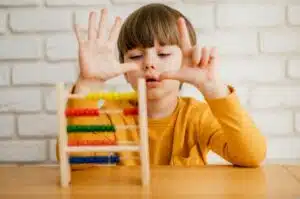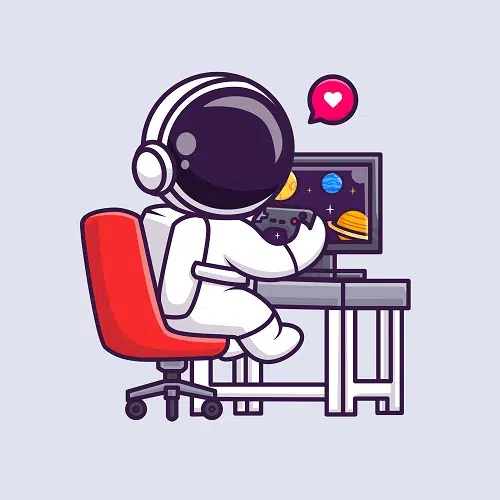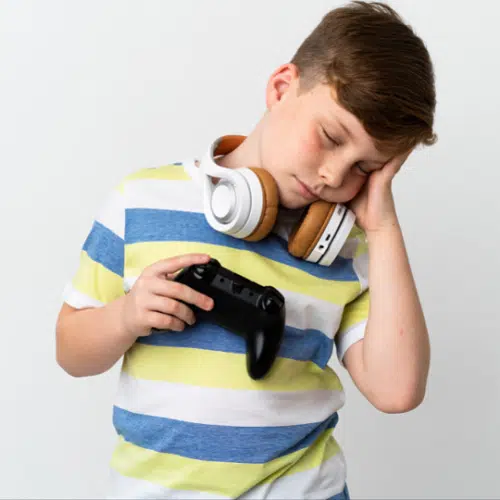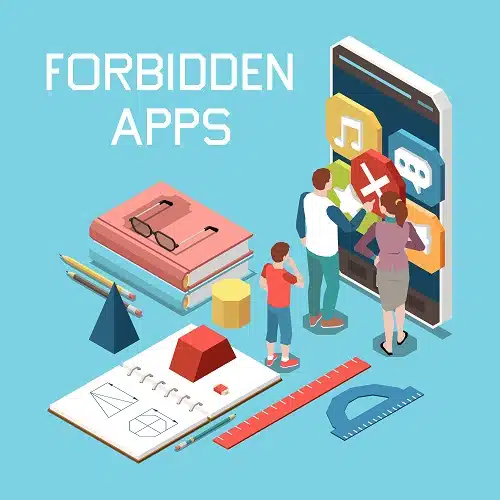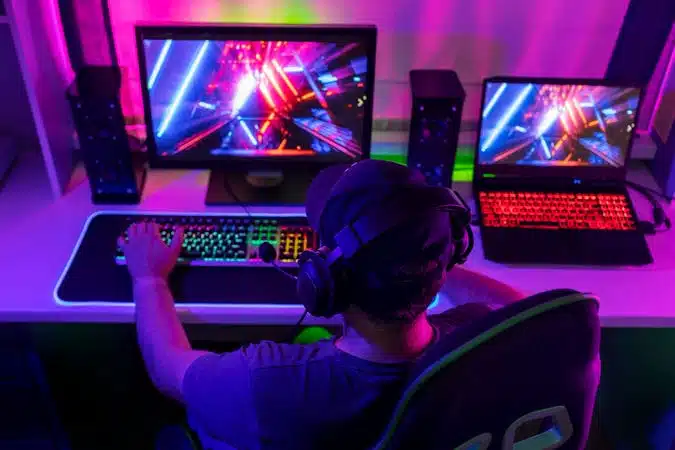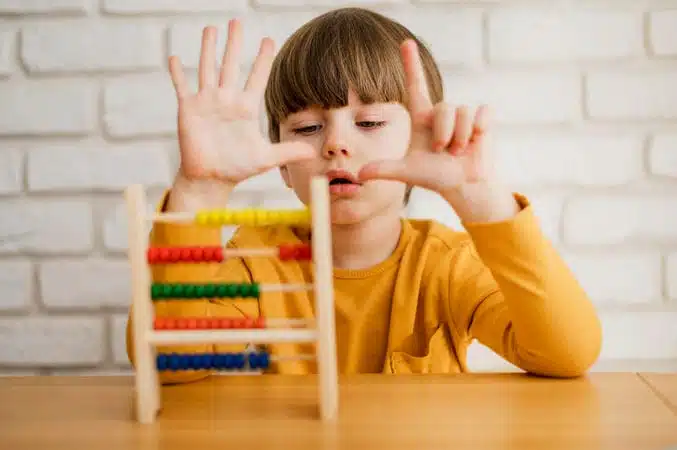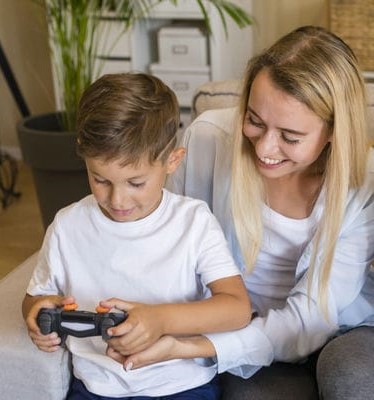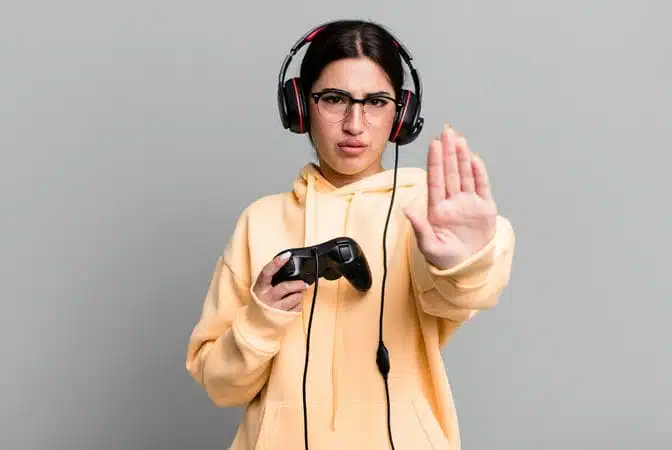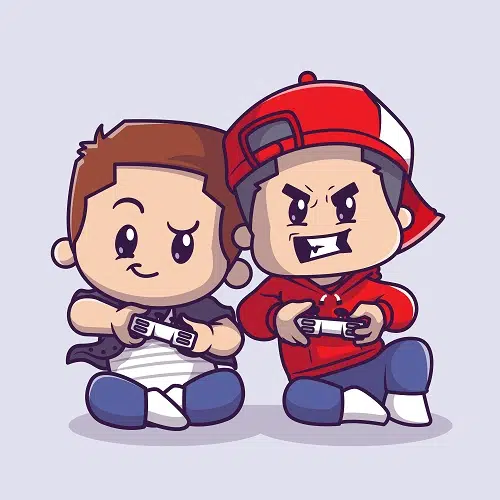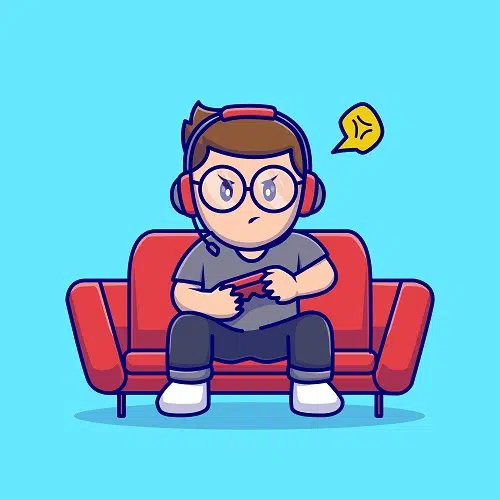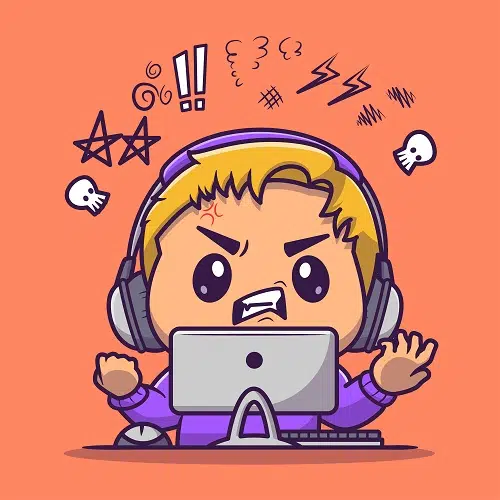Since the dawn of video games, billions of people worldwide have chosen to use one game or another to spend free time entertaining themselves. However, in the fifty years that video games have been available to the public, researchers have found countless benefits for those who play video games, especially kids.
Kids are known to be quickly captivated by the lights and sounds of video games. With a balance of game time added into their weekly or daily routines, kids can reap many of the following benefits in a safe and controlled environment. Many of these benefits can help a child’s natural development in mental, physical, emotional, and social skills.
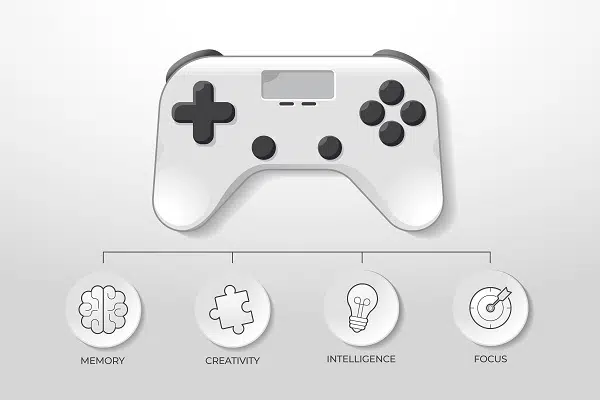
Improved Communication Skills
Many games available to kids require teamwork, such as “League of Legends” and “Fortnite.” Within teamwork, kids can learn how to communicate with their friends or complete strangers in random matchups to help win their matches.
Kids who play video games that require teamwork will learn through trial and error what language and tone work best to get different team members to achieve the goal and experience different styles of communication from team leaders, good and bad. Even if they deal with some poor communication, they can learn to defend themselves and much more.
“The Sims” is another game with development throughout the years that have improved with how Sims interact with each other. Nowadays, “The Sims 4” has Sims with distinct personalities, which will react differently in conversations. Which can teach kids how to empathize with someone who is a loner, eccentric, or goofball on Sim reactions.
One study showed that students who played video games had better communication skills after completing the study, even with single-player games. This study also implicated that video games should be a part of school work to promote communication and teamwork.
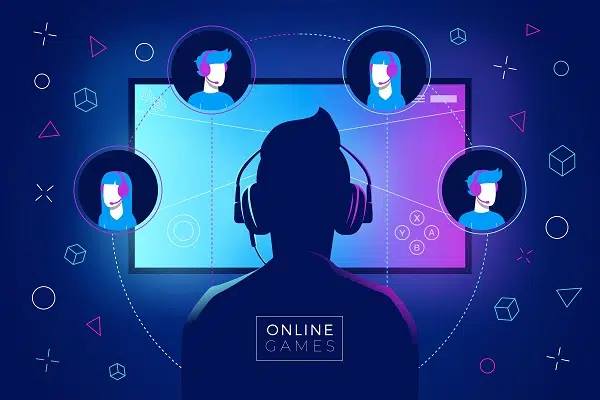
In-Game Relationships
In addition to learning social queues through gameplay, many people build life-long social relationships through video games. Many kids who have difficulties making friends in-person find it easier to speak with and relate to people online.
Humans are naturally social beings; however, it can be harder to form relationships with the age of technology and individualism. Even though billions of people play video games, there are still some social stigmas gamers experience, especially females. However, having a common interest can provide the ignition to start a conversation and relationship.
Role-playing games can also offer kids a sense of their own identity to help them discover their own identities through gameplay. Some kids may be more helpful towards team members and objectives, while others like to take charge.
Parents should supervise who their children are talking to in-game and learn about their online friends for their child’s safety. Cyberbullying and trolling are also prominent in the gaming community as with any other online social platform.
Family Bonding Time
Many adults enjoyed family game night from when they were kids, which usually included board games. Millennials were the first generation to grow up with video games. Unfortunately, not many of their parents played them with their kids growing up. Nowadays, millennials are starting to become parents and are using video games for family game nights.
It can be tough to find time to play video games with kids between everyone’s busy schedule. However, playing video games with your kids can allow you to spend time with your kids. While spending time with your kids, you’re not only socializing, but you could also be:
- Monitoring who they talk to in-game.
- Allow your kids to teach you something in-game.
- Teaching them how to regulate their emotions and appropriate responses to wins and losses.
- Working together on a team-building objective.
- Playing new games and ensuring the content is emotionally appropriate for your kids.
- Discuss different options in-game, especially when making decisions, and giving you and your kids a common topic to talk about.
- Giving your kids a chance to show off their skills and creations in-game.
- Teaching kids patience and impulse control if you’re taking turns in a single-player or adventure mode game.
Overall, playing video games with your kid is a wonderful way to get to know who they are, as well as providing valuable teaching moments. It also gives you a chance to unwind and relax! If you’re an experienced gamer, you may have to let your kid win a couple of times, especially if they’re easily discouraged.
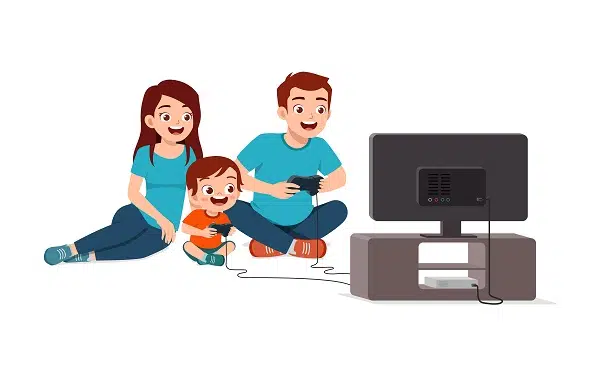
Enhanced Teamwork Skills
As mentioned earlier, many games require teamwork. What is significant about video games and teamwork is that at a young age, kids will learn different roles in games that are assigned to them and how to act within those roles, whether it’s a healer, stealth operative, or even team leader.
Playing video games can give kids the experience to work within their roles and understand the concept of teamwork. Much better than school projects, where many of us know and dread the experience of getting assigned a project and having one person do the majority of the work.
Teamwork is an essential part of most careers nowadays. By playing video games kids can learn how to work as a team. They will more likely work well on teams in their future careers, whether they are participating in or managing a project. Video games can also teach kids to work within their roles and know when it’s appropriate to step out of their assigned role to help.

Leadership
Video games are an excellent way to teach children leadership skills for when they are older. As mentioned earlier, certain video games that involve teamwork can give children a safe space to learn team skills, regardless of the role they choose or naturally fall into.
Many colleges and employers desire leadership skills. No matter the difficulty of the raid or objective in a video game, kids can learn how to be a leader through:
- Studying the objective.
- Working with the team to discover strategies for meeting the objective.
- Learning how to strategize and utilize team members’ strengths.
- Learning how to communicate effectively with team members, including praise and constructive criticism.
- Discovering methods to boost team morale during challenging objectives, as well as keeping the team modest if they find the content too easy.
Advanced Strategic Planning
Most video games, especially team-oriented games, require some form of strategy to complete an objective, no matter how big or small. Playing games like “Call of Duty” and “League of Legends,” you’ll have an objective to achieve. You’ll need to plan how to attain your short-term or long-term objective.
“World of Warcraft” is another popular PC game where there is a long-term objective that can take weeks or months to achieve, which is known as “raiding.” Raids are groups of ten to forty players working together with a strategy to defeat different encounters at increasing difficulties. Raids require knowledge of the played class and the correct coordination of usable abilities.
Strategic planning is essential for kid’s development, and it usually comes naturally. However, with the evolution of the workplace becoming more team-oriented and for people to be able to plan and strategize, getting these skills from video games is easily attainable.
Problem Solving Skills
Naturally, through our development as humans, we learn problem-solving skills. We learn the ways best suited for us to accomplish tasks. We can also learn from other sources more efficient methods to complete our tasks successfully.
Video games are a fantastic way to promote problem-solving skills, whether it’s figuring out a specific combination of movements or working with digital physics in constructing something in “Minecraft.” Kids can use trial-and-error to explore options to be able to do what they want to or need to in-game.
Even online game guides can help with gaining problem-solving skills. Online guides are an excellent way to learn different methods from achieving quest objectives to building a specific style of roofing in “The Sims.” If a kid willingly goes to a guide for help, it doesn’t show them giving up. It’s them acknowledging they need help.
Searching through game guides help kids prepare for the research they will need on papers and projects in the future. Teaching them how to identify and distinguish reputable online sources. Understanding that they need to consult a guide for a task also shows that they have or are starting to acquire flexible thinking skills.
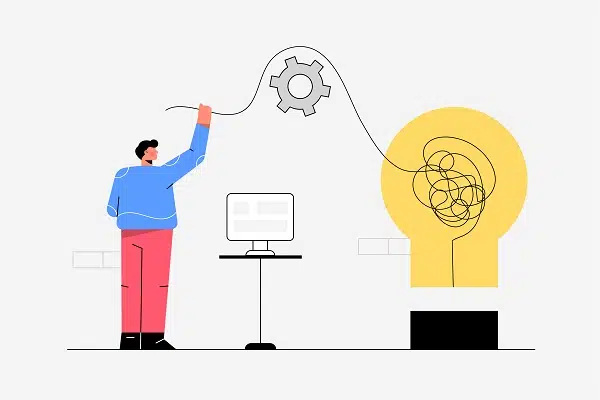
Flexible Thinking Skills
In addition to advanced strategic planning skills, kids can also learn how to think flexibly throughout playing video games. Some kids have difficulties understanding ideas outside of their own. They too may get fixated on one specific method to solve a problem, also known as a “one-track-mind.”
Many video games do not allow for one specific method for an objective to be done. Through playing video games, kids can learn how to explore options for getting an objective successfully through trial and error.
Adaptability is how you respond to changes in your environment and events. Which is a vital skill that kids need to learn (and some adults can hone). Employers are now not only looking at a candidate’s IQ, EQ (emotional quotient) but as well as how well they adapt to changes in the work environment.
Kids who play video games will also learn to be adaptable to different scenarios. Games use random number generators (RNG) for many events, and sometimes playing the game will be different every time, such as the new “Torghast” scenario in “World of Warcraft: Shadowlands.” Kids will learn to adapt to different scenarios and how to work with their environment.
Improved Hand-Eye Coordination
Every video game requires some form of hand-eye coordination, no matter the platform. Hand-eye coordination is generally learned through a child’s development and through playing with toys. However, with video games, fine motor skills can become enhanced, as well as their WPM (words per minute) and accuracy if they’re playing certain PC games.
Hand-eye coordination is essential in our everyday lives, and many things that we do require it. Some things are:
- Cutting food and cooking
- Driving
- Almost any sport e.g. Basketball, Baseball, Football
Gaining Visual-Spatial Awareness
Almost every video game that kids play has some sort of a map. Some games have small maps that players can memorize, while other games have worlds of maps. Through the repetition in movements throughout the games, kids can work out multiple parts of their brains, including the hippocampus, posterior parietal cortex, and entorhinal region.
Some games will have a more obvious map, close to a real-life map with roadways as well as a compass, like “World of Warcraft” and “Halo.” In other games, you will have to rely on landmarks and your memory for how to get around, like “Minecraft.”
Kids who have better spatial skills often succeed in STEM areas (science, technology, engineering, and math). One study found that training, including playing video games, can improve visual-spatial skills and that it’s never too late to start training.
Improved Emotion Regulation Skills
There will always be winners and losers in life, and video games are an excellent way for kids to learn how to be a modest winner and cope with losing. Some kids will naturally be good at this, and others may need a little bit of coaching, mainly through watching and imitation.
Another way video games can improve a kid’s emotional regulation is to help them learn how to handle criticism, especially in competitive games. They will learn how to grow and improve their skills when losing. If playing a team-oriented game, like “Rainbow Six Seige,” they can learn how to grow and develop from criticism from a team leader or teammates.
Even with “The Sims,” kids can further learn emotion regulation through attachments to Sims throughout their lifecycles. From birth to death, with how to react and to learn how other Sims react when another Sim dies in the game.
Kids will also learn how to deal with random events. Plenty of video games use an RNG to dispense rewards. Many times, RNG may not be in their favor, and they will have to repeatedly do an objective (also known as “farming”) to be able to get another chance at a reward they want.

Self-Control
Having self-control is essential for any human. It’s what most kids learn as they grow and is widely based on their observations of the people around them. Self-control means that they can wait to ask for help. They don’t have emotional outbursts when something goes wrong, and they also can control their movements.
Kids with poor self-control might be persistent and demanding when asking for help. Playing video games will help them gain the skills needed for patience, such as waiting a few days for a cache to open. Kids can also become more patient when waiting in queues for a match or a dungeon to pop, or working with lower-skilled teammates toward and objective.
Emotional outbursts can be a plague for gamers, especially those who have made it in the media for their outbursts for losing, such as Ninja. However, they don’t represent the majority of gamers. Kids will learn how to react when they’re angry, especially at a loss, in an appropriate way. This usually requires some minor coaching from parents.
Movement control is also something that kids can gain through playing video games. If a kid loses a match, sometimes they may throw their controller or hit a wall. With coaching and surveillance, you can teach your kid how to control their movements when they’re angry when they lose a game. It offers a safe space for them to explore their actions and consequences.
Gaining a Sense of Morals and Values
A significant aspect of role-playing games is that players get to choose their actions and the paths that they follow. Will you choose the apparent “good guys,” or will you join the team of the misunderstood “bad guys”?
Role-playing games are an excellent way for kids to explore their options with the choices they make in-game. As well as experiencing the consequences of their actions. Child development specialists say that children learn morals and values through interactive play and stories, which video games have.
Some games will show better values than others. “Grand Theft Auto” might not be the best game to teach kids morals, but games like “Elder Scrolls” make players choose the best decisions necessary for courses of action that can affect future gameplay. Another game, “Red Dead Redemption,” is where the main character starts off trying to redeem the things he’s done.
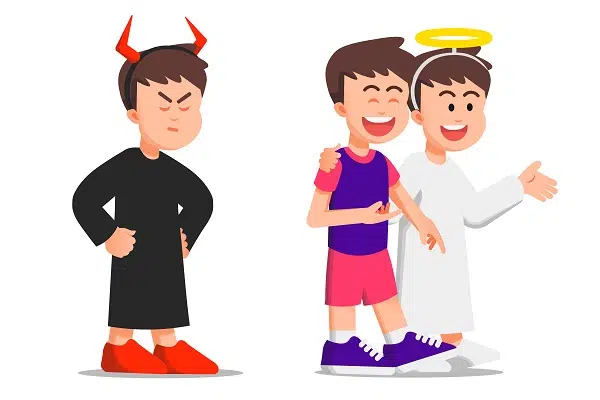
An Outlet for Creativity
Video games can come in all types of genres, and there are specific video games that promote creativity, depending on how you play them. Video games are also excellent for older kids to work on their creativity, especially when younger children’s toys no longer appeal to them.
“The Sims” allows players to create homes in a variety of settings, and with the expansions throughout “The Sims 4” and DLC (downloadable content), kids can create tiny houses to mansions in whatever aesthetic they like.
“Minecraft” is also an excellent game that promotes creativity through being able to build and manipulate the world around you within the constraints of the game or unlocking some aspects with DLC. A study showed that people who played “Minecraft” are significantly more creative than people who play games such as “Grand Theft Auto.”
Improved Quick Decision Making
Making decisions can be a difficult task, especially if you mull them over for some time and start overanalyzing. Many video games don’t permit time to make decisions, and most decisions made in video games are split-second. Should you keep doing damage or hide and protect yourself?
Being able to make instant decisions is essential in everyday life, and through playing video games. Kids will learn through trial-and-error what the best decisions to make in specific moments are. They will also develop higher cognitive functions in learning how to prioritize issues for which are the most and least important to solve at the moment.
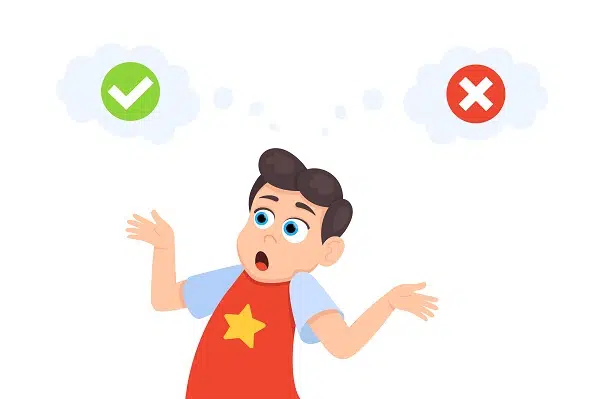
Increased Educational Skills
Regardless of what game a kid is playing, they will learn new vocabulary and can also pick up new languages (even if it’s Simlish). Some video games, such as “Fortnite” and “Hearthstone” have a basic vocabulary, while others, such as “World of Warcraft” and “Jurassic World Evolution” have a more advanced vocabulary.
Kids will also have to read objectives for some more challenging games. This can teach them reading comprehension, as well as their ability to understand and follow instructions further. If they are playing a game, like “World of Warcraft,” they can have up to twenty-five objectives to manage at one time, making them remember the instructions.
Not only can video games promote reading and vocabulary, but they can also teach and inspire kids to research more about cultures. Many video game settings and characters are inspired by cultures all around the world, as well as historical events. Kids playing video games might be inclined to research more.
Resource and Money Management
Pretty much every video game nowadays involves some type of resource or currency. Kids who play video games will learn how to manage their resources and money, and if they do so poorly, they can suffer in the game.
Kids will also have to learn to work with the space that they have. Some games have limited bag space, and kids will have to learn not to become attached to items and maybe sell or delete some items within their bags.
The study mentioned earlier also found that students who play video games are more resourceful than those who don’t.
Time Management Skills
Kids have hectic lives between school, homework, and any activity they participate in outside of school. Playing video games will help kids find a balance in their lives between school and recreation.
It’s not easy for many kids to manage their own time effectively, especially with video game addiction becoming a diagnosable condition. However, parents can quickly and easily help their kids with game time management, even if they’re not home by using parental control tools.
In addition to gaining time management skills between the game and real life, kids can also work on time management skills within the game as well. Some quests in-game are time-restricted, sometimes leaving minutes to complete the quest objective. Kids can learn how to efficiently use their time and build up their accuracy through time-restricted quests.
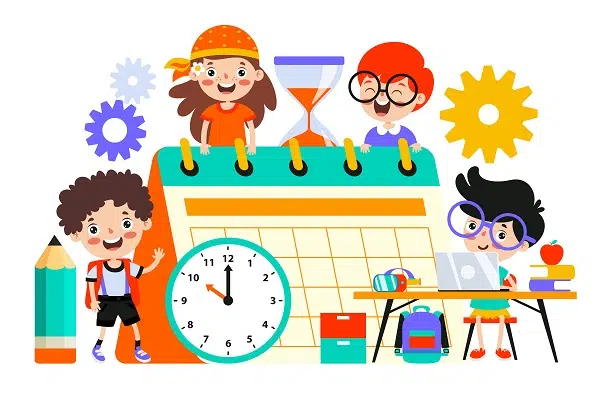
Self-Discipline
Within time management skills lies self-discipline. Kids who play video games not only learn how to control their emotions through the games, but they will also learn how to manage their actions within the game and out of the game. Self-discipline can be taught through learning to know when to stay away from the game or if it’s a time that it’s okay to keep playing.
Career Opportunities
In the fifty years that video games have become available to the public, video games have employed millions of people worldwide in many different sectors and are continuously growing. Kids who play video games may learn early an area they are passionate about. Some areas that kids may want to explore with video games are:
- Professional eSports gamer: with training and practice, eSports gamers can make a living just like professional athletes through competitions and sponsorships, and the number of games included in eSports competitions is growing.
- Digital design and animation are the basis of many video games. Designers and animators create the characters and the worlds that we all know and love from video games.
- Marketing and sales are crucial for any gaming company to make sure that their products sell and available worldwide.
- Coding and cybersecurity are used to ensure that players aren’t abusing the game and teams work together at preventing fraud.
- Story writing is vital in any video game. Story writers create storylines and narratives that capture and retain the attention of players.
- Public relations and event planning: since eSports has become a trendy area, many game companies hold competitive events in arenas with thousands of people. Like Activision Blizzard, some game companies hold yearly conventions that bring in thousands of players every year.
- Analytics and research: needed to help analyze how the game is played and work with new and more efficient gameplay methods and creation.
- Voice acting is significant for video games because the actors need to match their characters. Jim Cummings, also known as Winnie the Pooh and Tigger’s voice, has voiced in over fifty video games!
- Currently, the CEO of Nintendo, Shuntaro Furukawa, earns $2.4 million per year. Furukawa started out working for Nintendo in 1994 in accounting and worked his way up through marketing before becoming the Nintendo CEO.
Many game development companies also report some of the happiest workers, including Bungie (the creators of “Halo”), Electronic Arts Inc. (the creators of “The Sims” and “Madden”), and Nintendo.
Coping With Mental and Social Disorders
Unfortunately, mental and social disorders have been present in adults. They are also being diagnosed in kids and teens at an alarming rate. Some of the most common disorders kids are diagnosed with are:
Since kids have been so encaptured by video games, researchers have studied any benefits to playing video games, especially for kids with disorders. Specific video games have even been created to help kids manage their symptoms and cope with the disorder, such as “Endeavor RX,” which is approved by the FDA to treat ADHD.
Conclusion
With all of the video games available to kids, they can hone a plethora of skills. Even though video games may have gotten a bad rap over the years, with moderation and supervision, kids can develop the same as, if not better, than kids who don’t play video games.

